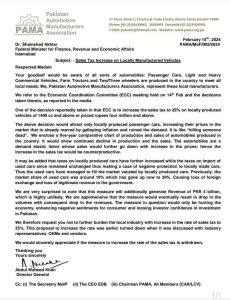
[ad_1]
After the Economic Coordination Committee (ECC) had accepted the proposal to increase the General Sales Tax (GST) from 18% to 25% on all cars above Rs. 40 lacs but with engine sizes lower than 1400cc, the local industry is considering it a killing move which in turn bring more instability in the country’s already vulnerable car sector.
The Pakistan Automotive Manufacturers Association (PAMA) has strongly condemned the recent decision by the Economic Coordination Committee (ECC) to increase the sales tax on locally produced vehicles. Labeling the move as “killing someone dead,” PAMA argues that it will further cripple the already struggling auto industry and harm the Pakistani economy.
Key Concerns:
Increased Prices: The 25% sales tax hike applies to cars above 1400cc or priced over Rs. 4 million, impacting a significant portion of the market. This will inevitably lead to higher prices, deterring potential buyers in an already inflation-ridden economy.
Demand Decline: PAMA highlights a five-year trend of declining production and sales in the car industry. The price increase is expected to further dampen demand, potentially negating any anticipated revenue gains.
Unfair Competition: While local cars face increased taxes, imported used cars remain untouched, creating an uneven playing field and incentivizing used car imports. This leads to foreign exchange outflow and reduced government revenue.
Investor Confidence: PAMA warns that the decision will erode investor confidence and discourage further investment in the Pakistani auto industry.
The association urges the finance minister to immediately withdraw the sales tax increase. They propose alternative measures to generate revenue, such as broadening the tax base or imposing taxes on specific luxury car segments.
Impact & Potential Solutions
PAMA’s concerns raise valid points about the potential negative consequences of the policy. It’s crucial to consider the impact on various stakeholders, including manufacturers, consumers, and the national economy. The government should carefully evaluate alternative revenue-generating measures that minimize harm to the auto industry and encourage sustainable growth.
The PAMA’s notification highlights its perspective for a balanced discussion which requires considering government justifications and potential solutions. Exploring alternative revenue sources, promoting affordability through targeted taxation, and fostering a competitive domestic industry are crucial aspects to consider for a thriving Pakistani auto sector.
[ad_2]
